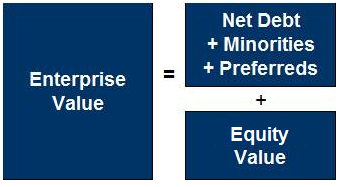How to compute market value of equity

Founded in by brothers Tom and David Gardner, The Motley Fool helps millions of people attain financial freedom through our website, podcasts, books, newspaper column, radio show, and premium investing services. Coming up with a reasonable valuation for a business can often be a challenge. The best indicator of company value is what market participants are willing to pay for it, and so companies whose shares are listed on public stock exchanges have an advantage in giving interested investors an estimate of their value that's easy to calculate.
Below, we'll look at how to calculate the market value of a firm's equity and how it relates to other valuation methods.
Equity Value vs Enterprise Value Multiples | Calculation | Examples
The simple calculation For companies with publicly traded shares, calculating the market value of equity is a trivial exercise. The current price per share for the stock will be available from easily accessible sources. The company's financial statements will include information on how many shares of stock are outstanding.
How to calculate the market value of equity — AccountingTools
Multiply the number of shares by the price per share, and you'll have the market value of equity, also known as market capitalization. Bear in mind that in some situations, the answer will be more complicated. For example, if a company has multiple classes of common stock, you'll have to account for the price and number of shares in each class. Similarly, if a company issues preferred stock in addition to common stock, then you'll need to gather information on both types of equity in order to come up with the total firm value.
Comparing market value with other valuation methods Those with familiarity in accounting will understand that the market value of a company's equity is only one measure of its valuation.
Alternatives can shed further light on its financial condition. For instance, many investors look at book value, which you can derive by taking the shareholder equity on the company's balance sheet and dividing it by the number of shares outstanding. Book value is less volatile than market value because numbers on financial statements are calculated on a quarterly basis, smoothing out movements and taking away the daily perturbations of the market. However, accounting conventions put limitations on the usefulness of book value.
Because some assets aren't subject to mark-to-market requirements, book value can reflect outdated valuations on those assets. Therefore, it can be entirely appropriate for shares to trade at a premium to book value in order to reflect accurate current values. One limitation on market value is that transactions on the open market involve small minority interests in publicly traded companies. Typically, when an acquiring company makes a takeover bid, it will offer a premium to the recent market price.
That premium reflects the added value of having a controlling interest versus being a minority shareholder. Looking at the market value of a firm's equity lets you compare the relative sizes of different companies more easily.
It's not the only way to put a value on a company, but it gives a useful starting point for your research.
This article is part of The Motley Fool's Knowledge Center, which was created based on the collected wisdom of a fantastic community of investors. We'd love to hear your questions, thoughts, and opinions on the Knowledge Center in general or this page in particular. Your input will help us help the world invest, better! Thanks -- and Fool on!
Try any of our Foolish newsletter services free for 30 days. We Fools may not all hold the same opinions, but we all believe that considering a diverse range of insights makes us better investors.
The Motley Fool has a disclosure policy. Skip to main content The Motley Fool Fool. Premium Advice Help Fool Answers Contact Us Login. Latest Stock Picks Stocks Premium Services. Stock Advisor Flagship service.
How to Calculate the Market Value of a Firm's Equity | The Finance Base
Rule Breakers High-growth stocks. Income Investor Dividend stocks. Hidden Gems Small-cap stocks. Inside Value Undervalued stocks. Learn How to Invest. Credit Cards Best Credit Cards of Best Credit Card Sign-Up Bonuses Best Balance-Transfer Credit Cards Best Travel Credit Cards Best Cash-Back Credit Cards Best No-Annual-Fee Credit Cards Best Small Business Credit Cards.

Mortgages Compare Mortgage Rates Get Pre-Approved How Much House Can I Afford? Taxes How to Reduce Your Taxes Deductions Even Pros Overlook Audit-Proof Your Tax Return What Info Should I Keep? Helping the World Invest — Better. How to Invest Learn How to Invest. Personal Finance Credit Cards Best Credit Cards of Best Credit Card Sign-Up Bonuses Best Balance-Transfer Credit Cards Best Travel Credit Cards Best Cash-Back Credit Cards Best No-Annual-Fee Credit Cards Best Small Business Credit Cards.
How to Calculate the Market Value of a Firm's Equity Business valuation is easy with this method. How to Invest in Stocks. Prev 1 2 3 4 Next.